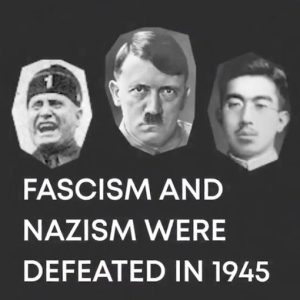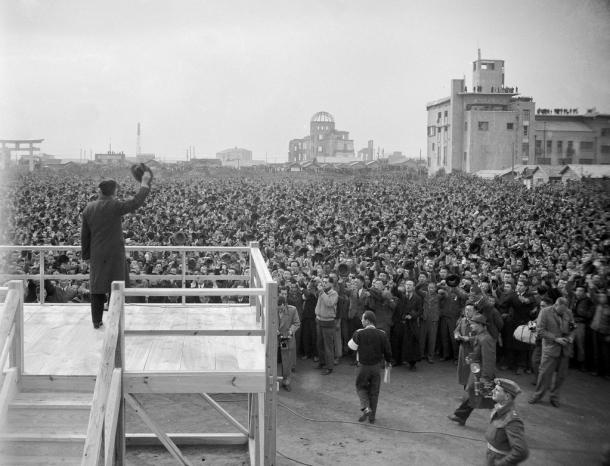The Ukrainian crisis has raised the issue of Japan in addition to the issue of neo-Nazis. One of the greatest goals of the United Nations, a coalition of victorious nations established with the end of World War II, was "Don't be threatened by Germany, which gave birth to the Nazis, and Japan, which gave birth to emperor fascism." The UN Charter has an enemy state clause with the intention of "containment of Germany and Japan." In February 2022, Russia invaded Ukraine in violation of the UN Charter while advocating the elimination of neo-Nazis. The US- NATO is taking this opportunity to do everything in its power to dismantle Russia. The United States used the CIA and its predecessor, OSS, to protect the Nazi remnants after World War II, and after the collapse of the Soviet Union, remnants also appeared in Ukraine. On the other hand, in April 2022, the video in which the Ukrainian government conducted a " blaming fascist Putin campaign" and posted the portrait of Emperor Showa alongside Hitler of the Nazis and Mussolini of Italy as a symbol of fascism was once erased by the protest of the Japanese government. The world was upset by the heterogeneity of Japan. Now, through the crisis in Ukraine, cold eyes are being focused on Japan during and after the war, mainly in the western countries (victorious countries).
Taking Japan one step further, "Emperor Hirohito is the leading leader of Japanese militarism, the chief executive officer of the war, and the war criminal." The history textbooks of most countries describe this, and the photo of Emperor Showa is listed alongside Hitler and Mussolini. People take this obediently. The portrait attached by the Ukrainian government is just unexciting in line with common sense.
 In fact, the Ukrainian government has since uploaded the video again. Western countries such as the US, Europe and protested against the deletion of Hirohito, the Zelensky administration utterly apologized, saying, "It is better to include the portrait of Emperor Showa to appeal to the Western countries and to meet the good sense of the world."
In fact, the Ukrainian government has since uploaded the video again. Western countries such as the US, Europe and protested against the deletion of Hirohito, the Zelensky administration utterly apologized, saying, "It is better to include the portrait of Emperor Showa to appeal to the Western countries and to meet the good sense of the world."
The baby boomer generation (born in the late 1940s and early 1950s in a broad sense) who studied in junior high school and senior high school in the 1960s did not feel uncomfortable when the Emperor Showa came in contact with the articles and photographs lined up with Hitler. It was a zeitgeist that existed both inside and outside the classroom.
In a society shortly after the defeat, centered on the generation of parents who barely survived the battlefield, hatred, repulsion, and repentance for the fact that the holy war commanded by His Majesty Generalissimo was actually an unprecedented war of aggression permeated. Only some right-wing forces were worried about "Hirohito = war criminals". Above all, the former Imperial soldiers, who continued to be ordered to "die for His Majesty," were deeply angry at the irresponsible system of the modern emperor system in contact with Japan's postwar treatment.
In 1960, right-wing terrorism such as the stabbed murder of Inejiro Asanuma, the chairman of the Socialist Party, and the attack on the president of Chuo Koron (Furyumtan) revived. They were condemned as an enemy of postwar parliamentary politics and democracy. However, the Furyumutan incident became a taboo view of speech about the emperor and a reluctance to refrain from doing so. In December 1961, Chuokoron-Shinsha stopped selling the special issue of "Science of Thought" emperor system, which was released by the company at that time, and even cut the magazine.
Today's Japanese "mainstream" has accused the Ukrainian government's video of treating Emperor Showa alongside Hitler as "disrespect for the emperor (the imperial family) and insulting the Japanese." In the last 30 years, the tendency to respect such an emperor and make it awe-inspiring has become much stronger. This issue is the main theme of this blog, and I will avoid discussing the changes in Japan's social climate, which is commonly referred to as "rightward inclination", in earnest. Please refer to many published articles.
A large number of reader comments are attached to articles in the Japanese media reporting on the Ukrainian government video issue. Most are objections and resentments. For the Japanese majority today, as mentioned above, "disrespect for the emperor is an insult to them." The idea of "the monarch and the people are one", which was sung in the Freedom and People's Rights Movement in the early Meiji era,1880's, is still alive today. However, the ideas of many civil rights activists who were aware of the conflict between civil rights and national rights deeply embrace the theory of natural human rights, the right of resistance, and even the theory of revolution. It was far beyond the level of Today's conservative thought of Japan.
The following comment generally seems to represent a moderate majority opinion.
"I'm neither a patriot nor a radical ideology, but it's sad to describe Emperor Showa like this. I wonder, I was very angry with the feeling that my parents were ridiculed. It may have been an aggression war from the perspective of the Western countries in the previous war, but there was no choice but to fight because of the pressure of the Western countries on Japan up to that point. To this day, Japan has reflected on the previous war and provided sincere and enormous assistance to other countries. "
At first glance, this seemingly moderate comment, "I was very angry with the feeling that my parents were ridiculed," said, "The emperor is a father and his subjects are babies." The thought to regard the nation as a family is imprinted in a simple form. Furthermore, the opinion that "it may have been a war of aggression from the perspective of Western countries, but the pressure on Japan by the Western countries up to that point forced the war" is the typical historical revisionism of Japan's right wing. "Japan, which has reflected on the previous war, has provided enormous assistance to other countries in good faith," is the same as the attitude of the supporters of the Abe administration (2006~07, 2012~2020) who used the far-right Nippon Kaigi as an ideological device. It is reminiscent of the curse and hatred of "how long do you want to apologize without thanking for assistance" against China and South Korea.
There is a difference in strength that is common to many Japanese feelings of this kind, but Article 3 of the Meiji Constitution "The Emperor is sacred and inviolable", that is, "The dignity and honor of the Emperor must not be defiled. ". In the comments on this video issue, there were a lot of opposition to the effect that "The emperor is more than a politician. It is truly regrettable to treat him in the same line as a popular fascist leader." The idea of the Meiji Constitution continues to live at the foundation of Japanese society.
There is no room for resistance or revolutionary theory to enter into the national view that "Japan has an unprecedented imperial family in the world that continues for 126 generations." Japan is "Hinomoto" and "Nippon" beyond space-time. It is a pitfall that makes you unaware of the prewar and wartime regimes. And there is no room for the revolutionary thought, which is the essence of democracy, to overthrow and abolish the kingship rule seen in the United States and Europe and to establish the power of the people.
"When any government tramples on its purpose, it reforms and abolishes it, establishes a new one, rebuilds the foundation on which it rests on the principles most appropriate for achieving the security and well-being of the people, and also. It is the people's right to reshape power into the most appropriate form. "
This is the heart of the 1776 American Revolutionary Declaration. For the Japanese who are unaware of the prewar regime, it would be a far-left ideology. In Japan, people are in an immortal kingdom, and there is no conflict between the government = governing power and the people = governed people. The legend that Douglas MacArthur, who landed in Atsugi at the end of August 1945, said, "Here is still a country which should have disappeared 400 years ago and where people are absolutely obedient to the patriarch of the nation." This is why the US and British rulers decided to control and use this strange warlike nation semi-permanently with a yoke.
The Ukrainian government apologized to Japan, of course, only in form. They didn't really think they were "misunderstanding the Emperor of Showa." Therefore, the portrait of Emperor Showa was re-uploaded before the root of his tongue dries. In fact, they did not initially add Japan to the "Ukraine Supporting Countries" list, but added it after controversy in Japan, which clearly shows the discomfort with Japan.
Japan's Liberal Democratic Party's diplomatic investigation group, the government, and the media, which have been repulsed, have been silent about the re-upload of Hirohito's portrait. They couldn't have been more blind to the common sense of the world. This incident should be an opportunity to feel the strangeness and isolation of this country.
Supplement: A huge wall that hinders a given democracy is Emperor Faith.
Emperor Hirohito visited Hiroshima two years after the bombing on Dec 1947.
